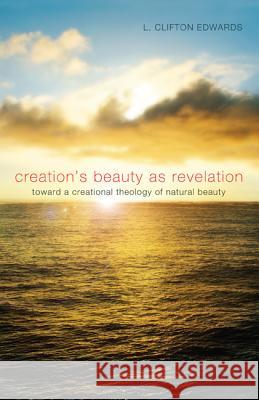Creation's Beauty as Revelation: Toward a Creational Theology of Natural Beauty » książka
Creation's Beauty as Revelation: Toward a Creational Theology of Natural Beauty
ISBN-13: 9781620323687 / Angielski / Miękka / 2014 / 194 str.
Creation's Beauty as Revelation: Toward a Creational Theology of Natural Beauty
ISBN-13: 9781620323687 / Angielski / Miękka / 2014 / 194 str.
(netto: 119,20 VAT: 5%)
Najniższa cena z 30 dni: 123,46
ok. 16-18 dni roboczych.
Darmowa dostawa!
Description: With an interdisciplinary approach, Edwards utilizes literature, aesthetics, world religions, and continental philosophy as avenues into the theology of natural beauty. This is an epistemological look at our aesthetically charged knowing of God through nature. Emphasizing our embodied experience of the world, Edwards examines the phenomenon of perceptual beauty, while questioning traditional notions of God's metaphysical "beauty." Drawing upon Michael Polanyi's philosophy of science, Edwards explores the human aesthetic and religious interface with the natural world. This philosophical approach is then linked to the poetic: Polanyi's "tacit knowledge" and Jean-Luc Marion's "saturated phenomena" give support to Wordsworth's "pregnant vision" of the natural world. This approach culminates in a re-envisaging of John Ruskin's typology of natural beauty: Ruskin's vision of the world can be adapted toward an understanding of natural revelation. Edwards brings this Romantic theology back across the Atlantic in dialogue with American nature writers and the uniquely American experience of wilderness and "frontier."
Description:With an interdisciplinary approach, Edwards utilizes literature, aesthetics, world religions, and continental philosophy as avenues into the theology of natural beauty. This is an epistemological look at our aesthetically charged knowing of God through nature. Emphasizing our embodied experience of the world, Edwards examines the phenomenon of perceptual beauty, while questioning traditional notions of Gods metaphysical "beauty." Drawing upon Michael Polanyis philosophy of science, Edwards explores the human aesthetic and religious interface with the natural world. This philosophical approach is then linked to the poetic: Polanyis "tacit knowledge" and Jean-Luc Marions "saturated phenomena" give support to Wordsworths "pregnant vision" of the natural world. This approach culminates in a re-envisaging of John Ruskins typology of natural beauty: Ruskins vision of the world can be adapted toward an understanding of natural revelation. Edwards brings this Romantic theology back across the Atlantic in dialogue with American nature writers and the uniquely American experience of wilderness and "frontier."











